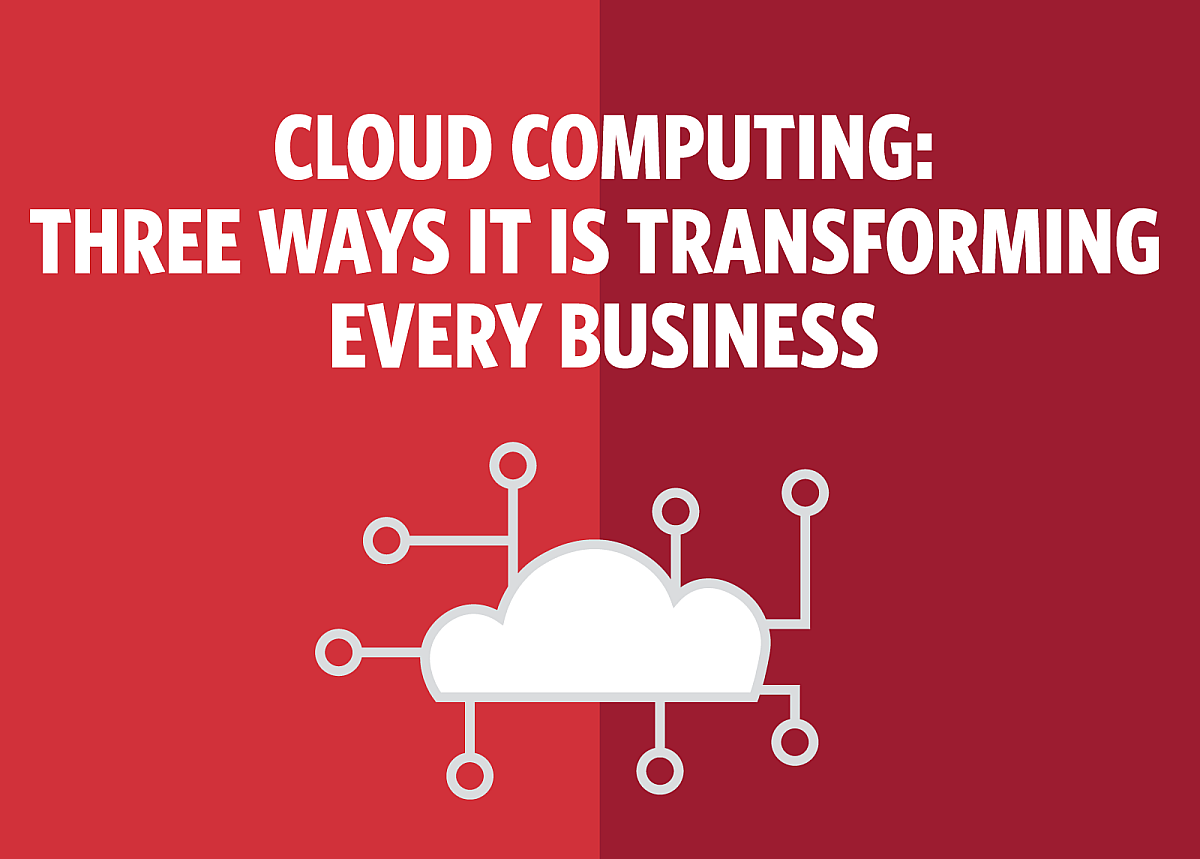
Cloud Computing: Three Ways It Is Transforming Business
The cloud. Perhaps a nebulous term once upon a time, cloud computing is now proving to be table stakes for a growing number of organizations. And given the benefits it is easy to understand why.
Whether the goal is to enhance data security, improve workflows and efficiencies, or leverage advanced technologies, cloud usage among today’s organizations is moving at a rapid clip.
Consider this: More than 88 percent of organizations use cloud in one form or another, and most expect to grow their usage over the next 12 months, according to a January 2020 survey by O’Reilly, a provider of technology and business training. What’s even more interesting is that about 25 percent of respondents said their companies plan to move all of their applications to a cloud context in the next year.
Now throw into the equation COVID-19 and the crucial role the cloud is playing in helping many organizations maintain continuity in the midst of a global pandemic.
The reality is that cloud computing is transforming business as we know it. To further explain, this article outlines three ways the cloud is changing the game in business, and addresses some of the factors that organizations should keep in mind as they embark on their journey to the cloud. Let’s take a closer look.
1. Reimagining Workflows and Integration Capabilities
Leveraging the cloud is not about doing what you’ve always done, just in the cloud. It’s about reinventing or reimagining workflow processes to gain greater efficiencies, drive automation, and better collaborate with clients.
“To realize the power of the technology in a significant way, you have to take a step back and rethink some of your processes and workflows,” Michael Cerami, vice president of marketing and strategic alliances for CPA.com, was quoted as saying in Accounting Today’s special report titled “Keeping Your Head in the Cloud.”
What can be improved? What can be automated? What are you looking to achieve? Asking such questions can help your organization clarify its objectives and better tap into the true potential of the cloud.
To unlock the power of the cloud it is also important to ensure robust integration capabilities. One of the benefits of using cloud-based applications is the fact that you can store and share data securely between software applications. This enables organizations to drive greater efficiencies through automation and build a suite of tailored best-in-class applications.
Therefore, it is important that an organization’s primary software application has strong support for data integration by making key data points easily accessible to third-party vendors, and providing support for both third-party vendors and customers.
Greatland’s Yearli is one example of using a best-in-class application to complement your primary software application. Some accounting applications leave much of the year-end W-2, 1099 and ACA filing work up to the user, such as uploading files to government agencies and printing and mailing forms to recipients. Yearli takes care of all of that, and provides a robust, secure, cloud-based platform with data integration capabilities. Yearli integrates with more than 25 accounting applications in a variety of industries, and uses a variety of methods, such as an API, to get data from your primary application.
2. Ensuring Business Continuity and Security
Organizations that move to the cloud enjoy the benefits of anytime, from anywhere access to data, as well as greater data security. This helps organizations better serve clients and ensure business continuity in the event of unforeseen circumstances. Case in point: COVID-19.
Cloud computing was already enjoying strong growth, according to research, then COVID-19 hit. As states began issuing stay-at-home orders, the cloud proved crucial in enabling organizations to swiftly respond and maintain continuity via remote capabilities.
“Cloud computing represents the catalyst and the enabler of the important technological shift that was already well underway before COVID-19. And it’s likely to be key to business resilience in the aftermath of the pandemic,” Doreen Bogdan-Martin, director of the International Telecommunication Union’s Telecommunication Development Bureau (BDT), was quoted as saying in a recent blog post by ITU News, a service of the ITU.
It is also important to note that, with a cloud-based infrastructure, data is significantly safer than it is sitting on a server in your office. This is because reputable providers of cloud-based solutions have the skills and resources to implement best practices in policies, procedures and systems to maintain robust data security. In fact, a Deloitte survey of IT leaders and executives found that security and data protection ranked as the No. 1 or No. 2 reason for cloud migration for more than half (58 percent) of respondents.
For instance, consider a cloud provider that delivers the following in data security:
- Databases are encrypted at both the field level and database level;
- Data is transmitted by and moved within its system using Transport Layer Security (TLS) protocol and 2048-bit encryption;
- Has strict controls and procedures governing security of data and undergoes an annual extensive SOC 2 Type 2 audit to ensure compliance;
- Systems have 24x7 live monitoring of potential threats and system issues; and
- Uses multi-factor authentication for login security.
The bottom line: Whether it’s a cyberattack, natural disaster, or a global pandemic, ensuring that your organization can keep client data secure and continue operations in the event of the unexpected is paramount. Failure to do so could negatively impact your organization’s profitability and reputation.
3. Unlocking Greater Potential
Cloud-based solutions are a gateway to unlocking the power of data. This is important as a growing number of organizations look to make more informed business decisions, drive efficiencies, and pivot from being information providers to strategic partners for their clients.
Take, for example, accounting firms. Today, a growing number of firms are shifting away from compliance-based work in favor of more higher-margin, value-add advisory and consulting services to remain competitive and drive profitability. Leveraging the cloud and advanced technologies enables firms to achieve this.
As noted by Deloitte, the fact that many organizations see the cloud as essential to data modernization comes as no surprise since so much data now resides in the cloud.
“Fifty-five percent of the surveyed IT leaders and executives strongly agree that data modernization is a key component of, or a reason for, their companies’ shift to the cloud. Executives today need timely and targeted analytics on existing data; many rely on a stream of insights based on data mining, exploration, and prediction,” authors wrote in a Deloitte Insights article.
There’s no doubt that cloud computing is transforming business as we know it. As organizations embark on their journey to the cloud it is important to fully understand the benefits and options available, what they are looking for in a cloud provider, the security policies and procedures in place, etc. Take the opportunity to view a demo, ask questions, and, if possible, transition your organization to the cloud in steps.
Adopting a few smaller cloud-based applications can provide your organization a valuable learning experience, help mitigate risk, and increase your confidence as you migrate more of your business to the cloud.
Cloud computing is proving to be table stakes for a growing number of organizations. Are you among them?
Latest News
-
 November 25, 2025
November 25, 2025New Alternative Furnishing Method for Forms 1095-B and 1095-C Comes with Complexities
The IRS has updated the Affordable Care Act (ACA) reporting process for Forms 1095-B and 1095-C. These changes aim to reduce administrative costs and simplify reporting, but they also create new compliance challenges for employers and health insurance providers.Read More -
 October 8, 2025
October 8, 2025Your Business Guide to 1099 Filing in 2025: Deadlines and Compliance Tips with Yearli
Businesses must prepare for 2025 IRS 1099 filing by understanding key deadlines for Forms 1099-NEC and 1099-MISC and leveraging e-filing tools like Yearli to stay compliant. This guide outlines important dates, recent IRS updates, and practical tips to avoid penalties and streamline the filing process.Read More -
December 30, 2024
Understanding Form 1099-DA: A Comprehensive Guide to Filing for Digital Asset Transactions
As the use of digital assets like cryptocurrencies and non-fungible tokens (NFTs) continues to grow, so does the need for clear tax reporting guidelines. To address this, the IRS has introduced Form 1099-DA, which will be required starting in 2025.Read More
